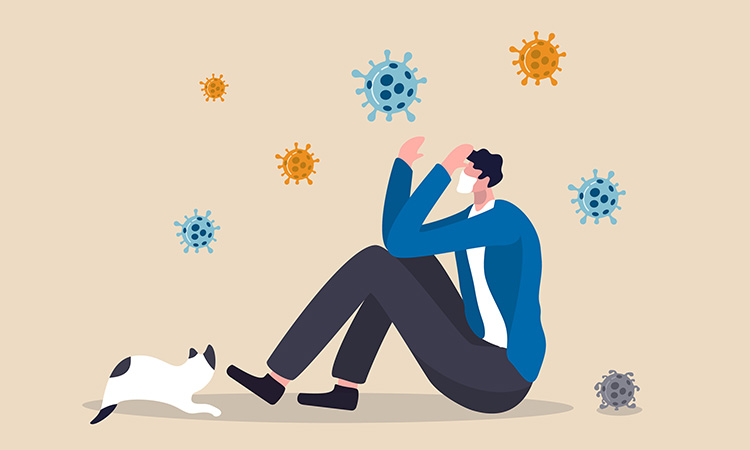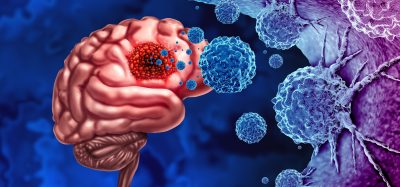Long COVID breakthrough
Posted: 20 July 2023 | Taylor Mixides (Drug Target Review) | No comments yet
In this Q&A, Dr Steve Gardner elucidates the genetic variations that appear to underpin the debilitating new condition, long COVID, that have been uncovered in a recent analytical study.


Long COVID, a chronic and debilitating condition impacting millions worldwide, manifests with an array of symptoms such as fatigue, cognitive dysfunction and respiratory issues. Despite extensive research, identifying genetic links and common pathophysiological mechanisms with other disorders like myalgic encephalomyelitis / chronic fatigue syndrome (ME/CFS), remains elusive. In a recent study, PrecisionLife employed a combinatorial analysis approach to uncover genetic associations and shed light on the underlying biological mechanisms of long COVID.
Utilising data from Sano Genetics’ Long COVID GOLD study,1 they focused on two subpopulations with severe or fatigue-dominant phenotypes. PrecisionLife assessed genetic signatures previously identified in ME/CFS patients to draw parallels between fatigue-related disorders triggered by viral infections. Additionally, they compared their long COVID analysis with known genetic associations in various chronic diseases, particularly neurological and metabolic disorders.
The combinatorial analysis revealed that 73 genes were significantly associated with long COVID development. Among those, nine genes were previously linked to acute COVID-19 and 14 showed differential expression in long COVID patients. These genes were primarily involved in neurological and cardiometabolic pathways. Notably, specific SNX9 genotypes were found to influence the risk of severe long COVID, depending on interactions with KLF15 and RYR3.
Further analysis of severe and fatigue-dominant subgroups highlighted distinct gene pathways. Immune pathways, such as myeloid differentiation and macrophage foam cells, were enriched in severe long COVID patients, while fatigue-dominant patients exhibited pathways related to metabolic signalling like MAPK/JNK. Additionally, they identified overlaps between the genes associated with fatigue-dominant long COVID and ME/CFS, especially those involved in circadian rhythm regulation and insulin regulation.
From the 73 long COVID-associated genes, 42 hold potential for novel drug discovery, with 13 already targeted by drugs in clinical development pipelines.
From the 73 long COVID-associated genes, 42 hold potential for novel drug discovery, with 13 already targeted by drugs in clinical development pipelines. Notably, TLR4 antagonists emerged as promising repurposing candidates, offering protection against cognitive impairment caused by SARS-CoV-2. These drug targets are currently being evaluated for potential use in treating long COVID and/or ME/CFS.
The study underscores the power of combinatorial analytics in dissecting complex diseases with diverse etiologies, like long COVID. By building upon previous genetic findings in COVID-19 and ME/CFS, they anticipate that access to larger and independent patient datasets will enhance understanding of long COVID and validate novel treatment options.
Drug Target Review interviewed Dr Steve Gardner, the study’s corresponding author, CEO of PrecisionLife and Chair of the UK Genomics Advisory Committee, to find out more.
What genetic variant was identified as significantly associated with long COVID and where is it located in the genome?
PrecisionLife identified at least 170 variants identified as significantly associated, and they are distributed across the genome. Some of these are seen in acute COVID-19, and we have also found overlap with other complex diseases with similar symptoms, including ME/CFS, neurodegenerative, cardiovascular, autoimmune and metabolic diseases. Our study has discovered multiple novel drug targets for long COVID, and several have the potential to repurpose existing drug candidates that are in existing clinical development pipelines.
The study mentions that long COVID is a heterogeneous disease entity, potentially influenced by both genetic factors and environmental risk factors. How can these findings contribute to our understanding of the complex interplay between genetics and environmental factors in the development of long COVID?
We can use our findings to identify the potential susceptibilities of specific patient subgroups and identify common risk factors if/when we have the detailed supporting clinical/environmental data for the patients (which was not available in this dataset). For different ancestries this could help to answer the question of whether higher exposure rates to SARS-CoV-2 led to more serious acute infection, which in turn led to more severe long COVID (as seems likely). If could also help inform whether specific co-morbidities and clinical factors play a role, or whether there are specific additional genetic risk factors (which does not appear, from the currently limited available evidence, to be the case).
What was the objective of this study conducted by PrecisionLife regarding long COVID?
PrecisionLife’s mission is to find better treatment options for patients with unmet medical needs, particularly in complex chronic diseases. Post COVID-19 condition (or long COVID) is a debilitating syndrome that the World Health Organization (WHO) estimates affects up to 20 percent of people infected by SARS-CoV-2. Though symptoms decline for most patients over time, some patients still experience symptoms such as post-exertional malaise or postural tachycardia syndrome (PoTS) up to two years after infection. Furthermore, the long-term health consequences of long COVID remain unknown, with suggestions of a doubling of the risk of developing cardiovascular issues. Precise diagnosis and treatment have proved challenging, in large part due to the complexity and diversity of their clinical presentation and their effects across multiple organ systems. We set out to identify combinations of genetic variants significantly associated with the development of long COVID and to examine the biological mechanisms underpinning its various symptoms, or any common pathophysiology with other conditions such as ME/CFS that present with similar symptoms.
How did the researchers utilise a combinatorial analysis approach to uncover genetic associations and biological mechanisms related to long COVID?
We used PrecisionLife’s unique combinatorial analytics platform to identify combinations of genetic variants significantly associated with the development of long COVID and to examine the biological mechanisms underpinning its various symptoms. We compared two subpopulations of long COVID patients from Sano Genetics’ Long COVID GOLD study1 cohort, focusing on patients with severe or fatigue-dominant phenotypes. We evaluated the genetic signatures previously identified in an ME/CFS population against this long COVID population to understand similarities with other fatigue disorders that may be triggered by a prior viral infection. Finally, we also compared the output of this long COVID analysis against known genetic associations in other chronic diseases, including a range of metabolic and neurological disorders, to understand the overlap of pathophysiological mechanisms.
What are some of the key findings from the study in terms of genetic associations, differences between severe and fatigue-dominant subgroups, and potential drug targets for long COVID and ME/CFS?
While the world community’s efforts have resulted in only a single genetic association (FOXP4), combinatorial analysis identified 73 genes that were highly associated with at least one of the long COVID populations included in this analysis. Of these, nine genes have prior associations with acute COVID-19, and 14 were differentially expressed in a transcriptomic analysis of long COVID patients. A pathway enrichment analysis revealed that the biological pathways most significantly associated with the 73 long-COVID genes were mainly aligned with neurological and cardiometabolic diseases.
Comparison of the genes uniquely associated with the severe and fatigue-dominant long COVID patients revealed significant differences between the pathways enriched in each subgroup. The genes unique to severe long COVID patients were associated with immune pathways such as myeloid differentiation and macrophage foam cells. Genes unique to the fatigue-dominant subgroup were enriched in metabolic pathways such as MAPK/JNK signalling. We also identified overlap in the genes associated with fatigue-dominant long COVID and ME/CFS, including several involved in circadian rhythm regulation and insulin regulation. Overall, 39 single nucleotide polymorphisms (SNPs) associated in this study with long COVID can be linked to nine genes identified in a recent combinatorial analysis of ME/CFS patient from UK Biobank.
Among the 73 genes associated with long COVID, 42 are potentially tractable for novel drug discovery approaches, with 13 of these already targeted by drugs in clinical development pipelines. From this analysis, for example, we identified TLR4 antagonists as repurposing candidates with potential to protect against long-term cognitive impairment pathology caused by SARS-CoV-2. We are currently evaluating the repurposing potential of these drug targets for use in treating long COVID and/or ME/CFS.
Author Bio:


Dr Steve Gardner is a serial technology entrepreneur with over 30 years’ experience developing and commercialising ground-breaking data science and informatics in the healthcare, life sciences and agri-food sectors. Never afraid to innovate, Steve has an established track record in building world-class companies, teams and products working at senior levels in the UK, EU and US for Fortune 500 and startup companies.
He is Chair of the UK Bioindustry Association’s Genomic Advisory Committee, a former Global Director of Research Informatics for Astra A/B, and has consulted with drug discovery and safety teams in over 20 biopharma companies.
References
- Sano [Internet]. sanogenetics.com. [cited 2023 Jul 19]. Available from: https://sanogenetics.com/study/gold








